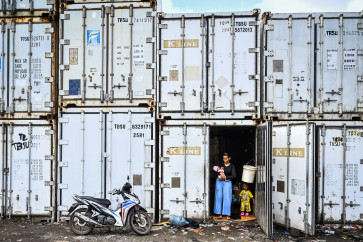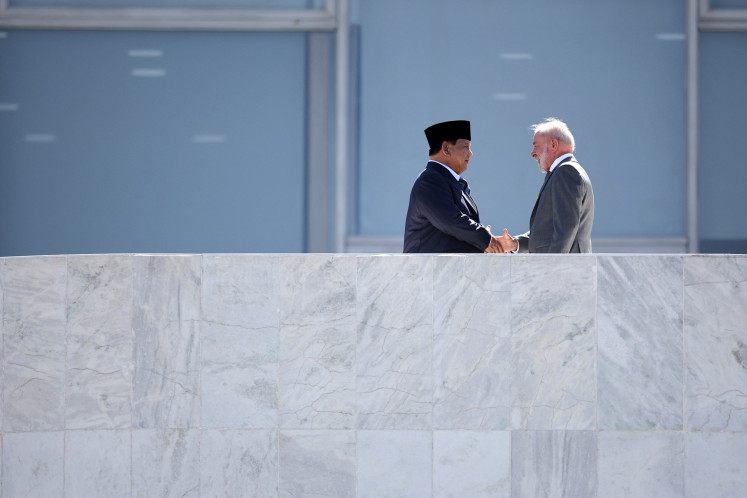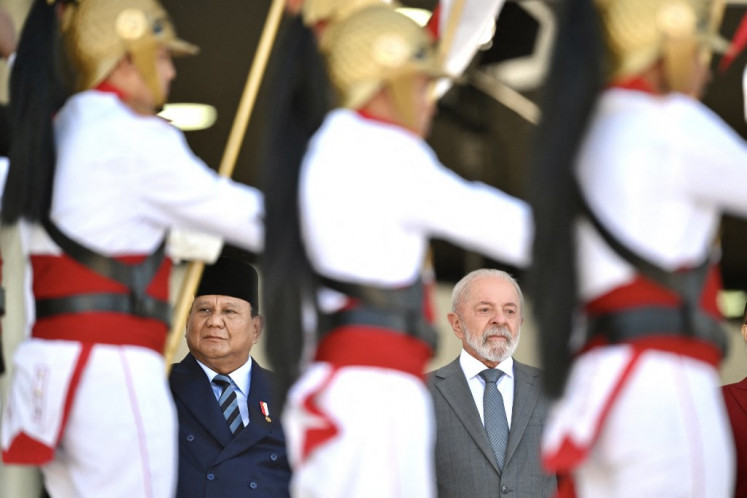Popular Reads
Top Results
Can't find what you're looking for?
View all search resultsPopular Reads
Top Results
Can't find what you're looking for?
View all search resultsAceh Party victory legitimate despite threat
During recent hearings on election-related disputes, the Constitutional Court heard a petition from SIRA — one of six local political parties contesting elections in Aceh for the first time
Change text size
Gift Premium Articles
to Anyone
During recent hearings on election-related disputes, the Constitutional Court heard a petition from SIRA — one of six local political parties contesting elections in Aceh for the first time. The Independent Voice of Aceh People’s Party (SIRA) charged that the Partai Aceh (PA) — the local party representing the former Free Aceh Movement (GAM) and the biggest winner in the local elections—of intimidating SIRA supporters and robbing the party of votes.
While rejecting SIRA’s demands for seat adjustments, the Constitutional Court acknowledged that intimidation and violence had tainted the April polls in Aceh. This echoes complaints from other political parties and NGOs in the lead up to the elections. But to what extent can the PA’s extraordinary victory – it won 33 out of 69 seats in the provincial assembly and absolute majorities in seven out of 23 regencies and cities – be attributed to intimidation and violence? Our recent study suggests some answers.
In the months before the elections, tensions were already high following a spate of political violence. The PA was a frequent victim of these attacks. According to the party, seven of its members and officials were murdered, while a number of its party offices were attacked – some with grenades, and its paraphernalia burned. Fingers were pointed at local elements within the armed forces, but anti-GAM militias were also thought to be involved.
This hostile environment appeared to harden PA leaders’ resolve. Factional rivalries were set aside as party members and supporters united around the shared struggle for local autonomy (independence before 2005). Ex-combatant networks and the infrastructure of the Aceh Transitional Authority (KPA) — the organization succeeding GAM after demobilization — were put to effective use in mobilizing the party’s support base. In large swathes of the province the PA completely dominated the political space.
In rural Aceh where physical presence matters more than television, the party’s flags and banners could be found in the remotest village. Placards printed in the Acehnese language appealed to “loyalty”. Some were menacing —“live together or die together”, according to one sign. PA activists even took a with-us-or-against-us approach to other Acehnese parties, calling some of them “traitors”, a term with troubling connotations. Some banners claimed that the PA was the only legitimate ‘local’ party defending Aceh’s autonomy because GAM had fought for the right to contest elections.
Clearly, intimidation was widespread, but was it responsible for PA’s landslide win? Our post-election survey reached 1,400 voters in 21 regencies and cities. Of those polled 96 percent of claimed not to have been pressured to vote one way or another — a finding supported by other election monitoring groups.
Among the small number of respondents that felt pressure to vote for a particular party of candidate, half of them said that such pressure did not ultimately influence their vote.
Our study suggests that the overwhelming majority of Aceh’s voters felt free to choose their preferred parties and candidates. Two key factors help to explain the PA’s strong polling.
First, PA voters expressed high levels of dissatisfaction with national parties. This was also evidenced by the high number of blank votes (golput) cast for the national assembly. Many voters cast ballots for district and provincial assemblies (DPRK and DPRA), but failed to post ballots for the national assemblies (DPR RI and DPD). Among six local parties, the PA was considered by many to be the only serious alternative to national parties.
Second, many voters expressed the view that the former rebels had earned their chance to govern. The right to form a political party and contest the elections was, after all, a condition of GAM agreeing to disarm and accept Aceh’s status as province of Indonesia. Many voters also expressed their approval at the performance and integrity of Aceh Governor Irwandi Yusuf, a former GAM combatant. Some also expressed concerns that the peace would not hold if the PA was not given this chance.
But while the PA’s victory is clearly legitimate, intimidation does remain a problem. Many Acehnese journalists and public intellectuals remain afraid to directly criticize the party of the former rebels.
Some received “warnings” when they tried to do so. Such a lack of open debate undermines Aceh’s hard won peace and democratization. It also threatens to hinder the party’s development, sullying its potential to serve as a model for local democracy in other parts of Indonesia.
The PA’s success beyond the elections will depend on how the party adapts to the post-election environment. If the party is to govern for all Acehnese, the party must rethink its overly combative approach to politics.
Party leaders must learn to engage their critics with arguments instead of vitriol. And intimidation of political opponents, local or national, of the kind seen in the lead up to the elections must come to an end. The party should also welcome other local political movements and parties, so that Acehnese interests are more comprehensively represented.
As the party’s new legislators begin training this month, they should feel confident in their electoral mandate, but humbled by another of our study’s findings.
The vast majority of the Aceh Party’s supporters in the recent elections said they would only continue to support the party if it performed well in the legislature. Intimidation won’t stop Aceh’s conflict-weary citizens from voting for someone else if the PA lets them down.
The writer is a lecturer in political science at the Crawford School of Economics and Government at the Australian National University. His research on local political parties in Aceh is supported by the Australia Indonesia Governance Research Partnership and the Centre for Democratic Institutions.










